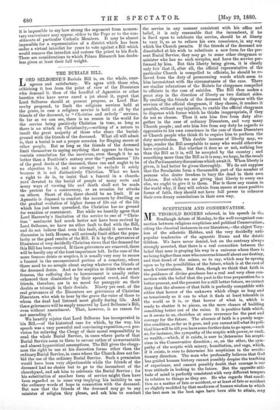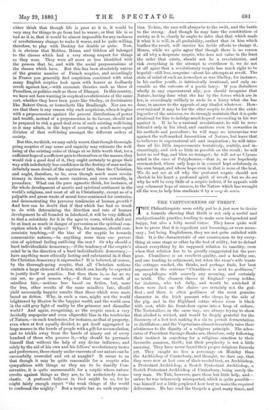SCEPTICISM AND CONSERVATISM.
MR. THOROLD ROGERS referred, in his speech in the Bradlaugh debate of Monday, to the well-recognised con- nection between religions scepticism and political Conservatism, citing the classical instances in our literature,—the abject Tory- ism of the atheistic Hobbes, and the very decidedly anti- popular tendencies of the agnostic Hume and the deistic Gibbon. We have never denied, but on the contrary always strongly asserted, that there is a real connection between the belief that man is groping his way in a universe where there is no being higher than man who concerns himself about our destiny, and that dread of the mines, so to say, which may be sprung upon us by the possibilities of the future, which is at the root of much Conservatism. But then, though we think that faith in the guidance of divine goodness has a real and very close con- nection with the belief that the past is the true preparation for a better present, and the present for a still better future, we cannot deny that the absence of that faith is perfectly compatible with either that horror of the unknown which clings as long and as tenaciously as it can to what it finds at least tolerable in the world as it is, or that horror of what is, which is ready to shatter it to pieces, on the mere chance of building something better out of the ruins. It is positive faith which, as it seems to us, cherishes at once reverence for the past and courage for the future. The absence of faith is a purely nega- tive condition, so far as it goes, and you cannot tell what its poli- tical bias will be till you have some further data to go npon,—such as, for instance, the sympathy of the sceptic with power, or rank, or wealth,—which, if it exists, is sure to :determine his scepti- cism in the Conservative direction ; or, on the other, the sym- pathy of the sceptic with misery, humiliation, and rags, which, if it exists, is sure to determine his scepticism in the revolu- tionary direction. The man who profoundly believes that God has guided human history cannot possibly despise the teaching of experience, and cannot possibly doubt, that courage is our true attitude in looking to the future. But the opposite atti- tude of mind is perfectly consistent with very different tempers in relation to things as they are. He who regards that condi- tion as a matter of fate or accident, or at least of fate or accident as slightly modified by that modicum of human wisdom to which the beat men in the best ages have been able to attain, may
either think that though life is poor as it is, it would be very easy for things to go from bad to worse ; or that life is so bad as it is, that it would be almost impossible for any rashness of revolutionary change to make it worse, and be quite willing, therefore, to play with Destiny for double or quits. Now, • it is obvious that Hobbes, Hume, and Gibbon all belonged to the classes which had a very strong respect for things as they were. They were all more or less identified with the powers that be, and with the social prepossessions of the classes which have. But this has been absolutely untrue of the greater number of French sceptics, and accordingly in France you generally find scepticism combined with what many English sceptics look upon with horror as foolhardy revolt against law,—with economic theories such as those of Proudhon, or politics such as those of Blanqui. In this country, we have not been wanting in sceptical revolutionists of the same sort, whether they have been poets like Shelley, or doctrinaires like Robert Owen, or iconoclasts like Bradlaugh. Nor can we see that there is any reason why such scepticism, when it begins with a prepossession against the present distribution of power and wealth, instead of a prepossession in its favour, should not be prepared to risk a good deal even of such existing well-being as it may admit, in the hope of securing a much more equal division of that well-being amongst the different orders of society.
But this, we think, we may safely assert, that though thorough- going sceptics of any sense and sagacity may estimate the well- being of the existing order of things at so little worth that, for a sufficient hope of a sufficient gain to themselves or the masses, they would risk a good deal of it, they ought certainly to grope their way with indefinitely less confidence in the destiny of man and in- definitely more dread of the caprices of fate, than the Christian, and ought, therefore, to be, even though much more revolu- tionary in desire, much more cautious, and even cowardly, in procedure. What can the pure agnostic think, for instance, of the whole development of ascetic and spiritual sentiment in the world's religions, and most of all in Christianity, except as of a palpable and gross waste of moral force continued for centuries, and demonstrating the perverse tendencies of human growth? And how can he doubt that if that which has had so much to do with determining the direction and rate of human development be all founded in falsehood, it will be very difficult to find a substitute for it in the ages to come, which shall not be at least as much in danger of perversion as the spiritual con- ception which it will replace ? Why, for instance, should com- munistic teaching,—if the bias of the sceptic be towards communistic notions,—be anything more than one perver-
sion of spiritual feeling outliving the rest ? Or why should a hard individualistic democracy,—if the tendency of the sceptic's
mind be in the direction of a hard individualistic democracy,—
have anything more ethically lasting and substantial in it than the Christian democracy it supersedes ? It is believed, of course, by the thorough-going sceptic, that all Christian notions contain a large element of fiction, which can hardly be expected to justify itself in practice. But then there is, so far as we can see, no good reason why,—if that was one result of mindless fate,—notions less based on fiction, but, none the less, other results of the same mindless fate, should yield necessarily happier results than those which were more based on fiction. Why, in such a case, might not the world brightened by illusion be the happier world, and the world seen in the cold grey light of reality be the grimmer and dimnaller world ? And again, recognising, as the sceptic must, a very decidedly unpopular and even oligarchic bias in the tendencies of Nature,—in such tendencies, for instance, as that of property, even when at first equally divided, to get itself aggregated in large masses in the hands of people with a gift for accumulation, and to trickle away from the hands of ninety out of every hundred of those who possess it,—why should he persuade himself that without the help of any divine influence, and solely by the aid of his own and his fellows' revolutionary tastes and preferences, these steady under-currents of our nature can be successfully overruled and set at naught ? It seems to us that though it may be quite reasonable for a sceptic who sympathises with things as they are to be timidly Con- gervative, it is quite unreasonable for a sceptic whose nature revolts against things as they are, to be audaciously icono- clastic. A profound believer in God might be so, for he might fairly enough expect "the weak things of the world to confound the mighty." But a sceptic has no such expecta- tion. To him, the race will always be to the swift, and the battle to the strong. And though he may hate the constitution of society as it is, clearly he ought to infer that that which made it what it is will, in all probability, outlast that in him which loathes the result, will survive his feeble efforts to change it. Hence, while we quite agree that though there is no reason at all why a desperate sceptic, who does not value in the least the order that exists, should not be a revolutionist, and risk everything in the attempt to overthrow it, we do not at all agree that a revolutionary sceptic has much right to be hopeful—still less, sanguine—about his attempts at revolt. The state of mind of such an iconoclast as was Shelley, for instance,. in his earlier youth, is intrinsically irrational, and only ex- cusable as the outcome of a poetic fancy. If you disbelieve wholly in any supernatural ally, you should recognise that Nature, having done what she has by the forces which are in her, is exceedingly unlikely to undo in a hurry what she has done, in answer to the appeals of any idealist whatever. How- ever rational it may be for the utter sceptic to detest the exist- ing order of the universe, we do strongly maintain that it is quite irrational for him to indulge much hope of succeeding in his war against it. If he be a rational revolutionist, he will be revo- lutionist only in his ideal, and cautious even to cowardice in his methods and procedure ; he will wage no internecine war against the well-marked favouritism of Nature, but leave that to believers in supernatural aid and inspiration ; he will intro- duce all his little improvements tentatively, craftily, and in- sinuatingly, and risk as little as possible on the result ; he will hoist no red flag, and blow no trumpet ; he will act as Ulysses acted in the cave of Polyphemus,—that is, as one hopelessly overmatched, whose only hope is in counsel kept sedulously in his own breast, and whose hope even in that is none of the best. We do not see at all why the profound sceptic should not cherish in his heart a profound spirit of revolt ; but we do see why he will be very little of a sceptic indeed, if he appeals with any vehement hope of success, to the Nature which has wrought all the woe, to help him eradicate it by a coup de mail.



































 Previous page
Previous page